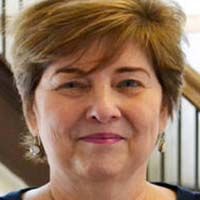Amy Murphy, MA, CTF, QTT
Profile
Ms. Murphy was certified by the Institute of Cultural Affairs in 2014 as a ToP™ (Technology of Participation) facilitator. She is also a Qualified Trainer of ToP Facilitation Methods and offers public and in-house training classes.
Ms. Murphy has been the principal of Amy Murphy Consulting providing public health consultation and professional facilitation services since 2007. Previously she worked for the City of Milwaukee Health Department as a Senior Manager overseeing childhood lead poisoning prevention, healthy homes and maternal and child health programs for 15 years. Ms. Murphy has a BS in Education from the UW-Milwaukee and a Master’s Degree in Public Health from the University of Illinois at Chicago.
Employment History
- The Kolbe Company – 2021-Present: ToP Facilitation Methods Trainer
- Amy Murphy Consulting – 2007-Present: Public Health Consultant and Professional Group Facilitator
- National Center for Health Housing – 2009-Present: Senior Public Health Advisor providing training and technical assistance to Childhood Lead Poisoning Prevention and Healthy Homes Programs.
- City of Milwaukee Health Department – 1992-2007: Senior Division Manager and Manager of Childhood Lead Poisoning Prevention Program.
Competency Areas
- Meeting Design and Facilitation
For 12 years, have been providing professional meeting design and facilitation services to multiple governmental and non-profit organizations. - Project Management
As the Division Manager of Home Environmental Health Programs and the Childhood Lead Poisoning Prevention Program at the City of Milwaukee Health Department, managed public health interventions, research projects and accountability for 8 distinct funding sources.As the Senior Public Health Advisor with the National Center for Healthy Housing, manage annual work plan deliverables across the state of New York to improve the capacity of Childhood Lead Poisoning Prevention programs.
- Leadership Development and Employee Relations
As the Division Manager of Home Environmental Health Programs and the Childhood Lead Poisoning Prevention Program at the City of Milwaukee Health Department, supervised 50+ staff people and provided leadership for a 100-person management team. - Training and Development; Training Delivery
Lead Author of the HUD Office of Health Homes and Lead Hazard Control Healthy Housing Guidance Manual. Conduct ongoing and annual training of New York State Department of Health Childhood Lead Poisoning Prevention Programs - Stakeholder Engagement
Chair, City of Milwaukee Lead Task Force
Chair, Fight Asthma Milwaukee
Education
Masters Degree in Public Health – June 1991, University of Illinois at Chicago, Delta Omega Honor Society
Bachelors of Science in Education – May 1985, University of Wisconsin-Milwaukee, Graduated Summa Cum Laude
Professional Associations
- National ToP Trainer’s Network
- Wisconsin Public Health Association, 1991-Present
- American Public Health Association, 1991-Present
Professional Certification and Awards
- Certified Facilitator – International Association of Facilitators (IAF)
- Certified ToP Facilitator – Institute of Cultural Affairs (ICA)
- Honoree, Leadership in Maternal and Child Health, Maternal and Child Health Education and Training Institute, Fourth Annual Summit conference – 1998
- Lead Star – National Lead Abatement Council – 1998
- Elaine Bartel Award for Academic Excellence – 1985
Publications and Presentations
-
Publications
- Nicholas, E. A., Dwyer, M., Murphy, A., Taylor-Fishwick, J. C., Cohn, J. H., Kelly, C. S. Coalition approaches for addressing environmental issues in childhood asthma. Health Promotion Practice, 2006: 7 (Supplement 2).
- Schlenker, T; Baxmann, R; McAvoy P; Bartkowski, J; Murphy, A. Primary Prevention of Childhood Lead Poisoning Through Community Outreach. Wisconsin Medical Journal. December, 2001.
- Taha, T; Kanarek, M; Schultz, B; Murphy, A. Low-Cost Household Paint Abatement to Reduce Children’s Blood Lead Levels, Environmental Research, 1999:81:334-338.
- Schultz, B; Pawel, D; and Murphy, A. A Retrospective Examination of In-House Educational Visits to Reduce Childhood Lead Poisoning. Environmental Research, 1999:80:364-368.
- Schultz, B; Strauss, W; Murphy, A; and Kanarek, M. Comparison of Wipe and Vacuum Sampling Methods for Assessing Dust Lead Levels in Homes: Data from the Milwaukee Lead Intervention Study, 1997.
- US EPA; Quantech; and the Milwaukee Health Department. Seasonal Trends in Blood Lead Levels in Milwaukee, 1996.
- US EPA; Quantech; and the Milwaukee Health Department. Effect of In-Home Educational Intervention Children’s Blood Lead Levels in Milwaukee, 1996.
- University of Wisconsin-Madison; Milwaukee Health Department; and the US EPA. Milwaukee Prospective Educational Intervention Study, 1996.
- Schlenker, TL; Johnson Fritz, C; Murphy, A; Shepeard, S. Feasibility and Effectiveness of Screening for Childhood Lead Poisoning in Private Medical Practice. Archives of Pediatrics & Adolescent Medicine, 1994: 148:761-764.
- Schlenker, TS; Johnson Fritz, C; Mark, D; Layde, M; Linke, E; Murphy, A; Matte, T. Screening for Pediatric Lead Poisoning – Comparability of Simultaneously Drawn Capillary and Venous Blood Samples. Journal of the American Medical Association, 1994: 271(17): 1346-1348.
-
Presentations
- Catalytic Collaboration: Leading Social Change Through Community-Academic Partnerships, Thematic Poster Session, Community Campus Partnerships for Health Annual Conference, April, 2007
- Lead Poisoning Guidelines and Eradication, American College of Preventive Medicine Annual Meeting and Conference, February, 2004
- Narrowing the Gap: Mobilizing Resources in the Greater Milwaukee Community to Address and Eliminate Health Disparities, Urban Health Forum, Partnerships for Healthy Milwaukee, November, 2003
- The Milwaukee Childhood Lead Poisoning Prevention Program, Cleveland Lead Summit, Case Western Reserve University School of Medicine, Cleveland Department of Public Health, Cuyahoga County Board of Health, June 2003
- Keynote Presentation: Milwaukee’s Goal: Lead-Free Children Pathways to a Lead-Safe City, National Lead Grantee Conference – Eliminating Childhood Lead Poisoning: Our Challenge for the Decade, Atlanta, Georgia – December, 2000
- Plenary Session Panelist: The Changing Environment: Future Challenges and Options, National Lead Grantee Conference – Eliminating Childhood Lead Poisoning: Our Challenge for the Decade, Atlanta, Georgia – December, 2000
- Childhood Lead Poisoning in Milwaukee, Pharmacogenetics, Pharmacology and Toxicology Forum, Medical College of Wisconsin CME Program, December, 1999
- Designing and Administering Local Lead Hazard Control Programs: Lessons Learned to Date, National Lead-Safe Housing Conference and Exposition – Working Together for a Lead-Safe America: Overcoming Obstacles & Maximizing Opportunities, Philadelphia, PA – April 1998
- How Neighborhood Advocates and Community-Based Agencies can Develop and Sustain their Capacity to Create Lead-Safe Housing, National Lead-Safe Housing Conference and Exposition – Working Together for a Lead-Safe America: Overcoming Obstacles & Maximizing Opportunities, Philadelphia, PA – April, 1998
- Low-Cost Strategies for Reducing Lead Hazards, National Lead-Safe Housing Conference and Exposition – Working Together for a Lead-Safe America: Overcoming Obstacles & Maximizing Opportunities, Philadelphia, PA – April, 1998
- Innovative Public Agency Programs that Help a Community Achieve Its Job Development and Lead-Safe Housing Objectives, National Lead-Safe Housing Conference & Exposition – Working Together to Make Lead-Safe Housing a Reality, Washington, DC – April, 1997
- Building Lead-Based Paint Evaluation and Control Activities into Municipal and County Government Programs, National Lead-Safe Housing Conference & Exposition – Working Together to Make Lead-Safe Housing a Reality, Washington, DC – April, 1997 and Chicago, IL – November, 1997
- Technical Assistance Forum on Lead-Safe Housing: City Program Issues, National Lead-Safe Housing Conferences & Exposition – Working Together to Make Lead-Safe Housing a Reality, Washington, DC – April, 1997
- Diagnosis and Management of Childhood Lead Poisoning, Grand Rounds, Children’s Hospital, Milwaukee, Wisconsin – July, 1995
- Lead Hazard Control Methods & Techniques – What Have We Learned?, HUD Grantee Conference, 1995: Moving Toward a Lead-Safe America, Washington, DC – September 1995
- Lead Hazard Reduction – Evaluating the HUD–Funded Projects, American Public Health Association – 122nd Annual Meeting, Washington, DC – November, 1994
- Models of Effective Partnerships, Second Annual Big Cities Health Conference, Chicago, IL – July, 1994
- Building Skills for Developing Partnerships, Second Annual Big Cities Health Conference, Chicago, IL – July, 1994
- Developing and Creating Demand for Abatement Subsidies, Building A Lead-Safe Future – Second Comprehensive National Conference – May, 1994
- Planning Prevention Programs, Building A Lead-Safe Future – Second Comprehensive National Conference – May, 1994
- Common Sense Approaches to Needs Assessment, National Childhood Lead Poisoning Prevention Education Conference – Building Better Programs in Lead Education, Atlanta, GA – March, 1994
- Evaluating Program Effectiveness, National Lead Poisoning Prevention Conference – Building Better Programs, Atlanta, GA – December, 1992
Partial Sample of Projects
New York State Health Department Childhood Lead Poisoning Prevention Program. Provide training, technical assistance, program improvement and capacity building to 14 counties and the City of New York to prevent childhood lead exposure.
Overdose Fatality Review. Provide professional group facilitation services for the cities of Oak Creek, Cudahy, South Milwaukee and St. Francis to review unintentional overdoses (case review) and develop recommendations to enhance multi-sectoral capacity to prevent overdose fatalities.
HealthCare Collaborative Against Sex Trafficking: Provide professional group facilitation services to healthcare providers across multiple organizations in Milwaukee to enhance the capacity to identify, serve and refer victims and survivors of sex trafficking.
University of Wisconsin-Milwaukee – Wisconsin Child Welfare Professional Development Services. Provide project management and professional facilitation services to maternal and child health programs and training and technical assistance providers through the City of Milwaukee Community of Practice and the State of Wisconsin Training and Technical Assistance Workgroup.
Partial Sample of Clients
Government
- New York State Department of Health
- City of Milwaukee Health Department
- City of Oak Creek
- Kenosha County
- City of Racine
- HUD Office of Healthy Homes and Lead Hazard Control
Health & Medical Institutions & Affiliated Organizations
- Common Ground HealthCare Cooperative, Board of Directors Chair (Current)
- Family Planning Health Services
- HealthCare Education and Training
Philanthropic Organizations/Foundations
- Kresge Foundation
- Robert Wood Johnson Foundation
- The Pew Charitable Trust
- JPB Foundation
Non Profit
- National League of Cities
- Clarke Square Neighborhood Initiative
- Walker’s Point Youth and Family Center
- Agape Community Center
- Waukesha and Ouzaukee Counties Continuums of Care

